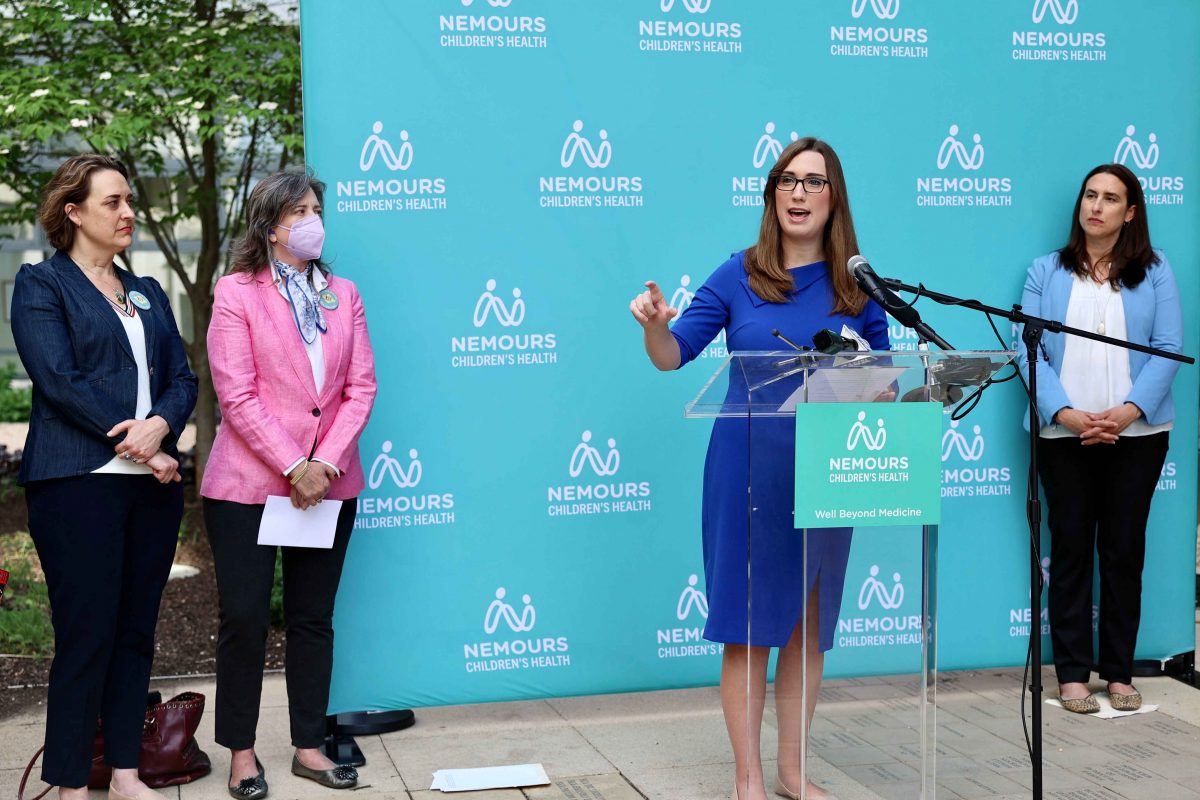DOVER – Sen. Sarah McBride unveiled legislation today to create a comprehensive program in the Delaware Department of Health of Social Services dedicated exclusively to the removal of dangerous lead-based paint from homes throughout the First State.
“Decades of universal screenings among small children clearly shows that lead-based paint remains, far and away, the leading cause of lead poisoning among Delaware’s children, hundreds of whom are still being exposed to lead paint more than 40 years after these dangerous products were removed from store shelves,” said Sen. McBride, chair of the Senate Health and Social Services Committee.
“Fortunately, this is a problem that we can solve,” she said. “Senate Bill 9 will focus the resources and attention needed to eradicate the lead-based paint that remains in homes throughout our state, once and for all, and save countless families from the risk of serious neurological damage and cognitive harm.”
Introduced Monday, Senate Bill 9 would create procedures for state health officials to identify and remediate homes that contain exposed lead paint, establish a state-funding mechanism to cover the cost of those repairs, and initiate a process to screen every residential rental property in Delaware for exposed lead paint.
More than half of homes in Delaware were built before 1978, when the production and sale of lead-based paint was banned for residential use. Some builders with lead paint in their inventory also continued to be used in homes through the 1980s. Many of those older homes still contain lead-based paint – often under layers of new paint – that deteriorates and creates lead-containing dust, exposing children and adults to significantly higher risks of neurological damage, developmental issues and other health concerns.
Under current state law, Delaware each year tests about 12,000 children under that age of 6 for elevated blood lead levels as a prerequisite of their enrollment in childcare, nursery school or kindergarten. Over the last 10 years, more than 4% of children tested have had elevated blood-lead levels.
SB 9 would create the Delaware State Lead Paint Program (DSLPP) in the Delaware Department of Health and Social Services specifically tasked with determining where children whose test results show elevated blood lead levels were most likely exposed, and undertaking state-funded remediation efforts at that location if warranted, as funding permits.
“With state resources assigned specifically to assist families with lead-exposed children in under-maintained properties, DHSS believes we can reduce the number of children exposed by these unkept properties,” said Molly Magarik, Cabinet Secretary of the Department of Health and Social Services. “These steps, assisted by $2.9 million in proposed investments in the Governor’s recommended budget to expand our childhood lead poisoning surveillance program and remediate environmental sources of lead in homes, will make great strides in protecting our children from the long-term, pervasive exposure to lead.”
SB 9 requires DSLPP to notify parents or guardians of children with elevated blood-lead levels of the test results and any remediation efforts that will be undertaken by DSLPP, as well as recommendations for medical treatment, within 70 days of the test results being received by DHSS.
The owners of rental homes would be barred from increasing rents for three years after their property has undergone a state-funded renovation, a mechanism intended to encourage landlords to voluntarily undertake lead paint screenings and remediation on their own.
DSLPP also would be required to provide adequate advance notice and, as funding permits, reasonable alternative housing until a lead abatement at their residence is completed.
“Although lead paint was banned in 1978, the lingering detrimental and dangerous health impacts from exposure are still, very much a reality, especially in homes and other rental properties that haven’t been renovated.” said Rep. Larry Lambert, D-Claymont, the House prime sponsor of SB 9. “This bill provides the dedicated direction and funding allocation to ensure we’re on track to eradicate the removal of lead-based paint in homes across the state.”
SB 9 further creates the Delaware Lead Paint Abatement and Remediation Fund. Money deposited in the fund could only be used to cover the cost of lead-paint screenings, abatements, temporary lodging and administrative costs.
Finally, SB 9 expands the membership and duties of the existing Childhood Lead Poisoning Advisory Committee to include recommending to the General Assembly plans for future legislation requiring all rental properties in Delaware built before lead-based paint was banned in 1978 to be screened for the presence of exposed lead paint.
SB 9 has been assigned to the Senate Health and Social Service Committee.
###



